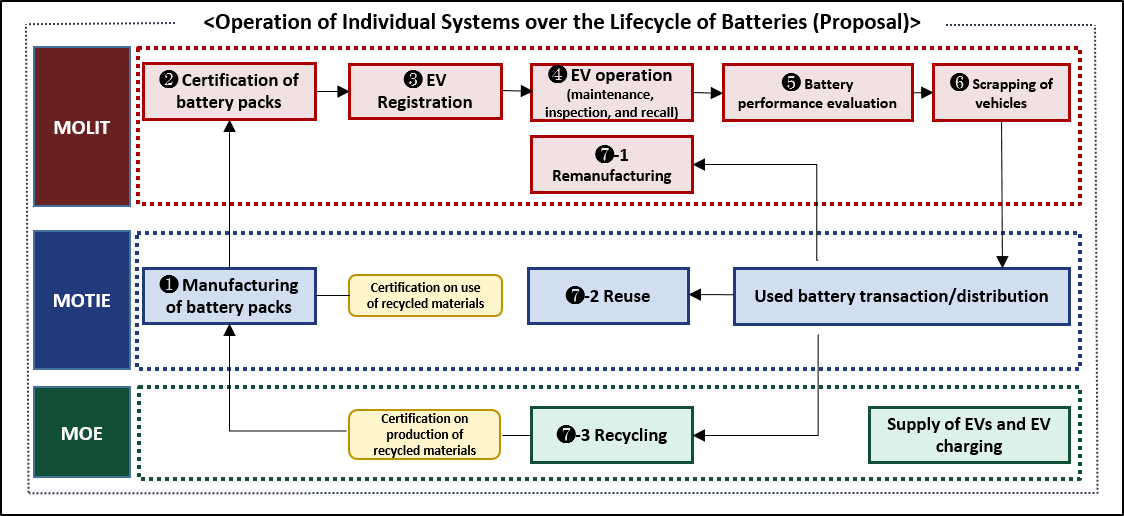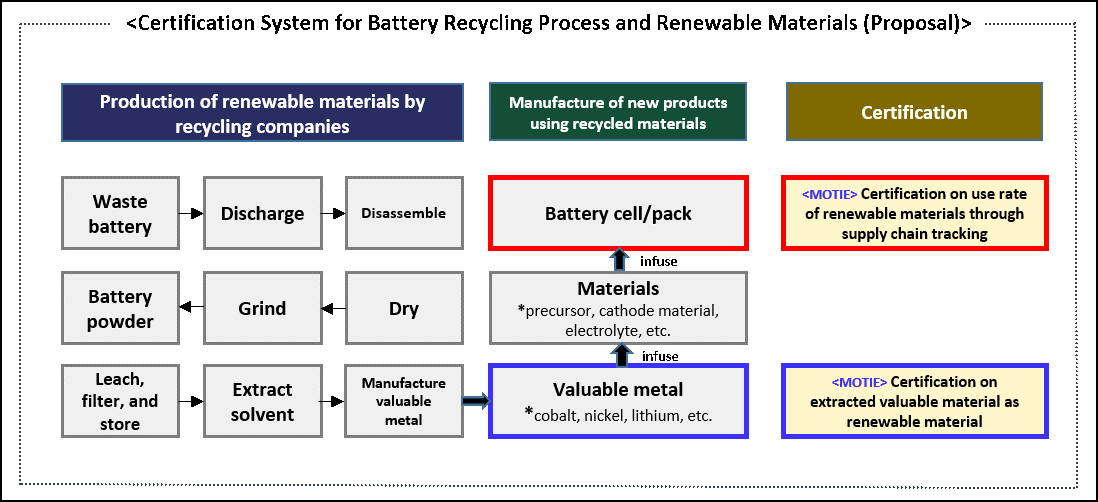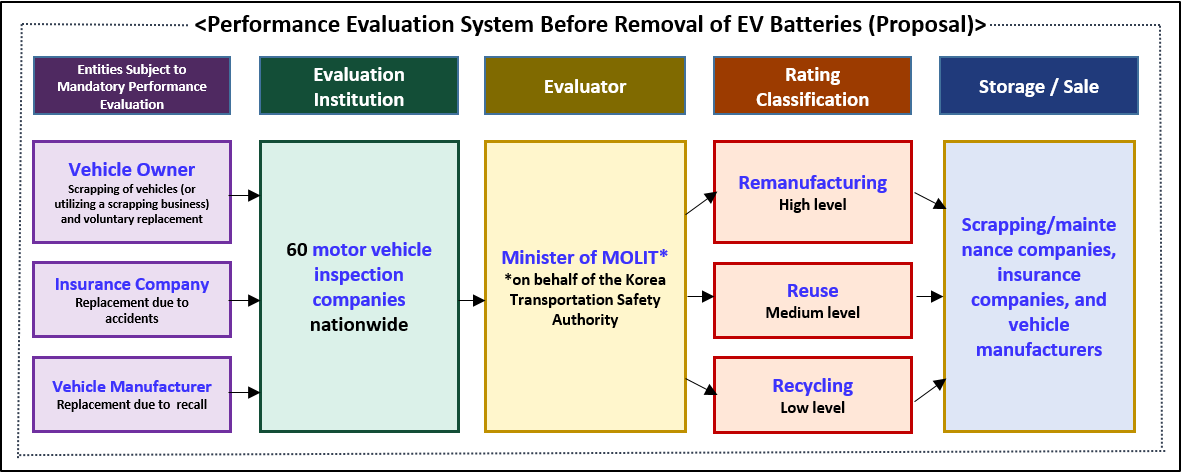At the Ministerial Meeting on Economic Affairs held on July 10, 2024, the Government announced the “Plans to Develop Laws, Institutions and Infrastructure to Foster the Used Battery Industry (the “Used Battery Measures”)” (Link) in collaboration with the Ministry of Economy and Finance, the Ministry of Trade, Industry and Energy (the “MOTIE”), and the Ministry of Environment (the “MOE”).
The Used Battery Measures are a follow-up to the “Plan to Strengthen the Competitiveness of the Secondary Battery Industry over the Lifecycle of Batteries” announced on December 13, 2023 and are designed to improve the used battery management system and allow the domestic battery industry to preemptively respond to global trade regulations. The major details of the Used Battery Measures are as follows:
|
1. |
Consolidated Bill Proposal to Foster Used Battery Industry |
|
Authority |
Individual Laws |
Provisions |
|
MOTIE |
The Act on Promotion of the Conversion into Environment-Friendly Industrial Structure (the “Environment-Friendly Industry Act”) |
Registration of distributor/re-user, certification on the use of renewable raw materials |
|
MOE |
Act on Resource Circulation of Electrical and Electronic Equipment and Vehicles (the “Act on Resource Circulation of Electronic Equipment”) |
Certification on the production of recycled raw materials |
|
Wastes Control Act |
Registration of recycling business |
|
|
Ministry of Land, Infrastructure and Transport (the “MOLIT”) |
Motor Vehicle Management Act |
Definition of remanufacturing, registration of remanufacturer, performance evaluation before removal of batteries and safety inspection |
|
2. |
Establishment of Battery Lifecycle Assessment System |

|
3. |
Introduction of Renewable Raw Material Certification System |

|
4. |
Introduction of Performance Evaluation Before Removal of EV Batteries |

|
5. |
Preparation of Used Battery Distribution System |
Matters to Be Reflected in the Business Registration System Under Individual Laws
|
Type of Business Entity |
Statutes |
Governing Administrative Entity |
Note |
|
Distributor |
The Environment-Friendly Industry Act and its subordinate statutes |
MOTIE |
New |
|
Remanufacturer |
Article 30-2 of the Motor Vehicle Management Act and Article 40-5 of the Enforcement Rules of the same act |
MOLIT |
- |
|
Re-user |
The Environment-Friendly Industry Act and its subordinate statutes |
MOTIE |
New |
|
Recycler |
Article 25 of the Wastes Control Act and Article 28 of the Enforcement Rules of the same act |
MOE |
- |
The legislative plan for the Used Battery Measures is significant in that it will make it easier for Korean battery exporters to respond to the trade regulations of major countries overseas, including the EU’s obligation to use renewable raw materials for new batteries and China’s EV battery management platform. In addition, it will lay the legislative foundation for the domestic battery management system throughout the lifecycle of batteries. In particular, the pre-removal performance evaluation is expected to improve the recurring use of used batteries by helping quickly classify batteries at the end of their use based on their rating. In other words, after the use of an EV, the battery parts will be (i) replaced (or repaired) and then re-assembled into an EV battery (“Re-manufacturing”), or (ii) re-assembled for other purposes, such as being used in an energy storage device (“Reusing”). The system will allow batteries to be classified efficiently before raw materials such as black powder are extracted (“Recycling”).
The Government expects that at least 100,000 used batteries will be produced by 2030 (for reference, about 810,000 vehicles were scrapped in 2023). It is crucial for companies engaged in businesses relating to used batteries to thoroughly comprehend and be prepared for the Consolidated Bill as well as individual laws that are to be enacted/amended in the future. In particular, remanufacturers of used batteries, re-users and recyclers are required to undertake the following legal reviews in advance:
-
First, it is necessary to establish measures to comply with the safety standards that are expected to be strengthened for the distribution and use of used batteries. As the safety management of lithium, a water reactive chemical, is being emphasized due to a recent fire at a lithium electric plant in Hwaseong, it is expected that battery separation standards as well as transportation/storage methods will be specified in more detail. Therefore, it is necessary to be prepared in advance to minimize potential legal risks.
-
Second, it is necessary to utilize the renewable raw material certification system, which will be introduced for used battery recycling, not only in response to the EU’s regulation pertaining to the ratio of recycled raw materials used, but also in calculating Scope 3 greenhouse gas emissions. On March 26, 2024, the MOE announced that it would pursue a pilot project for certification of renewable raw materials together with companies that recycle waste EV batteries. The certification system of renewable raw materials is expected to be utilized in connection with the existing electronic processing system (i.e., the Allbaro system) established under Article 45 of the Wastes Control Act.
-
Third, it is necessary to review whether used batteries are subject to the Wastes Control Act. Through a resolution of its administrative committee (April 2024), the MOE recently revised relevant regulations by excluding black powder from the scope of waste regulations as long as it complies with applicable recycling standards (e.g., removal of organic solvent, prohibition of mixing foreign substances, etc.). Meanwhile, the circular use of waste EV batteries is not deemed to be “waste” to the extent that it complies with the terms and conditions that have been prescribed under the Act on Promotion of Transition to Circular Economy and Society, but will be still subject to the Act on the Transboundary Movement of Hazardous Wastes and Their Disposal if waste batteries are exported.
As such, it is necessary to continuously identify various legal issues that may arise in terms of safety, renewable raw material certification, waste management, among others, throughout the course of the distribution and utilization of used batteries that have undergone pre-removal performance evaluations.







